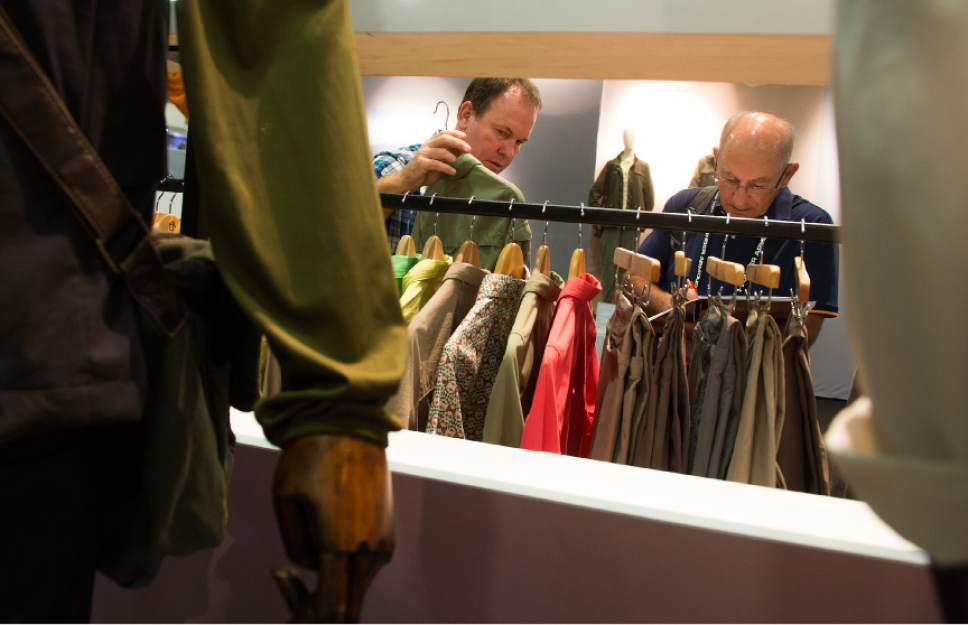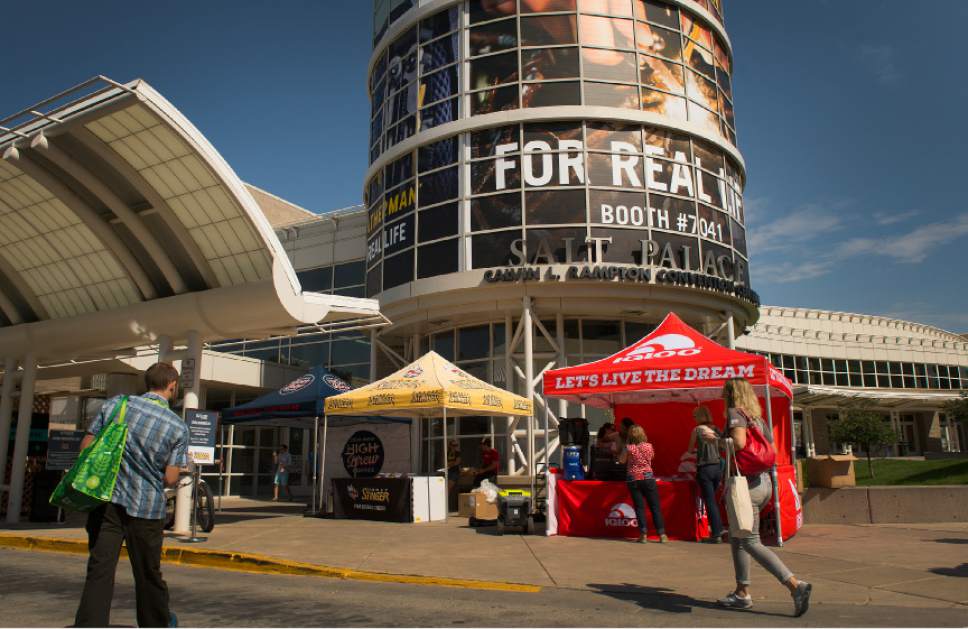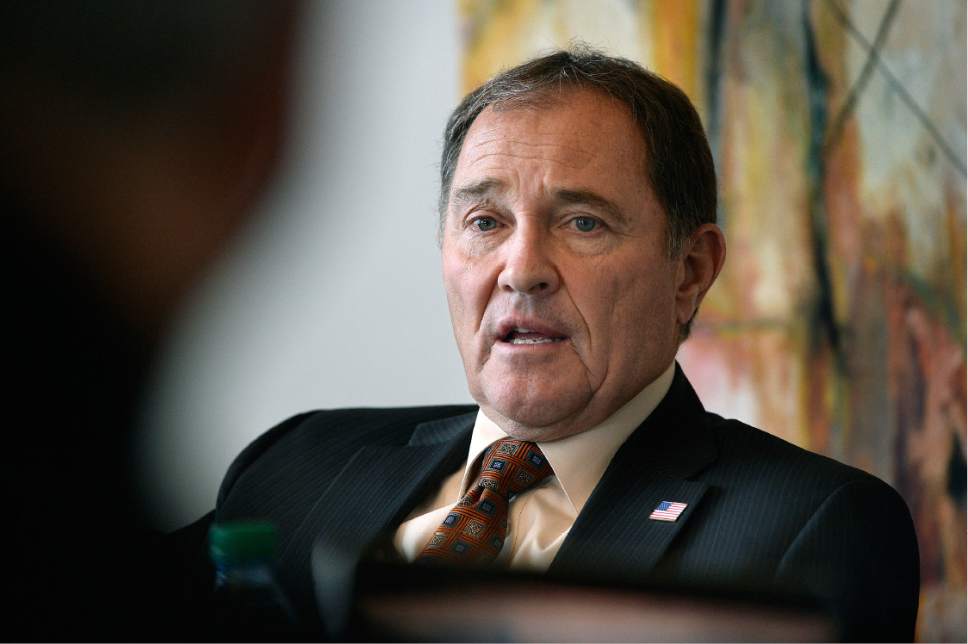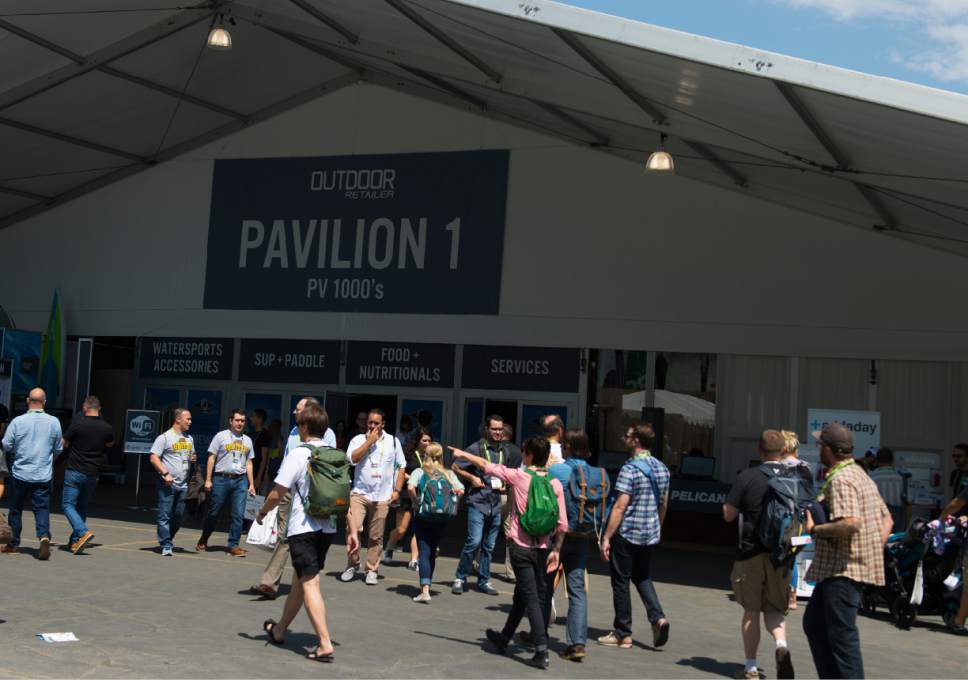This is an archived article that was published on sltrib.com in 2017, and information in the article may be outdated. It is provided only for personal research purposes and may not be reprinted.
For almost an hour on the phone Feb. 16, Utah Gov. Gary Herbert rattled off reasons he believed executives from the outdoor industry should keep their lucrative trade show in Salt Lake City.
The conference call was cordial. Herbert said he believed the group could find ways to bridge differences and keep the two shows a year in Salt Lake City, where it has resided for two decades.
Then, in the call's final moments, executives from the Outdoor Retailer shows and its vendors told Herbert he had only one or two weeks to show stronger support for public lands. Failure to do so would cost the state the Outdoor Retailer events and the chance to land another trade show for the cycling industry.
"If you're giving me an ultimatum here on the phone, then the answer is, I guess, we're going to have to part ways," Herbert said, with resignation in his voice.
With that, Utah lost both shows. The executives thanked the governor and quickly ended the call.
A recording of the conference call, obtained by The Salt Lake Tribune through a public-records request, shows how chief executives behind some of the country's best-known outdoor apparel and gear aired their grievances over Herbert's opposition to two national monuments. They also were concerned about whether state leaders valued the millions of acres of public lands across Utah.
Herbert asked the retailers to keep their show in Salt Lake City and lauded their contributions to remaking cities like Moab and Ogden, but he made clear that he and the GOP-led Utah Legislature were sincere in their criticism of President Barack Obama's designation of Bears Ears National Monument and wanted that move rescinded.
The executives from brands that included Patagonia, The North Face and REI told the governor if he wasn't prepared to at least make a public statement in support of the new layer of protection for the 1.35 million-acre monument, which Obama created under the Antiquities Act in December, the show and the economic bonanza it brought to Utah was prepared to sever ties with the state.
"What's happened in the last few weeks has put us in the position where, frankly, you probably have a week or two to come up with a strong statement and get support for whatever statement you're willing to make in order for Utah to be included in the [bidding] process for where the show ultimately ends up," said Gordon Seabury, chairman of the Outdoor Industry Association.
"You're looking at 60 to 90 days before we make a decision," Seabury added, "and significant additional action must happen."
Herbert said elected leaders in Utah shared the same overarching goals of protecting public lands and that he signed the resolution at the behest of some who live near the new monument and the Grand Staircase-Escalante National Monument who detest the management of federal lands.
"Some of those deep feelings about a monument still reside, particularly with a lot of the local people in the rural parts of our state who are struggling economically," the Republican governor said. "Probably they're just angry because of that and this [monument] gets kind of caught up in it."
Herbert also told the executives past presidents had been "cavalier" with their application of the 1906 Antiquities Act. He said the act was intended to grant power to protect the "smallest area necessary to protect the objects that we're trying to preserve."
"If you look at the Grand Staircase," he said, "that's clearly not what happened."
The call highlights how the governor's office and outdoor groups differed on the process of protecting Bears Ears.
Herbert repeatedly said he wanted the monument rescinded so Congress could pass legislation protecting the area and giving local Indian tribes a bigger role in managing the land.
The executives asked why the governor and legislators preferred stripping the existing protection before replacing it with a different layer of federal protection.
"Never really in our history of working in conservation ... has a state sought to rescind a national monument, let alone two," said Patagonia CEO Rose Marcario.
As Herbert asked for "a little slack" and more time to have a conversation about Bears Ears, Marcario said: "It would have been nice to have these conversations before a resolution was passed to rescind a national monument, which as I said, is a historic action. ... That's something we've never seen [in the conservation movement]."
Amy Roberts, executive director of the Outdoor Industry Association, warned that rescinding the monument by executive order "will threaten the Antiquities Act."
Paul Edwards, Herbert's spokesman, later told The Tribune the governor was open to the idea of keeping the protection in place while Congress debated legislation on the area.
"It's a fair question to ask what the proper ordering should be. Is it repeal and replace? Is it replace and repeal?" Edwards said. "The governor in his conversations has raised that as a point of possible discussion.
"But there's just very strong insistence, at least our sense when we had this telephone conversation [earlier this month], was that they wanted a conscientious rejection of the position that there shouldn't be a monument," he said, adding that Herbert felt "that isn't in the overall best interest of the state."
The call makes clear that is what outdoor leaders asked for, posing what Herbert considered an ultimatum that would prove to be an impasse.
While the discussion may have been about public lands, the subtext was money.
Marcario told Herbert that the CEOs on the call represented $5 billion in revenue. Darrell Denny, executive vice president of Emerald Expositions, which owns Outdoor Retailer, told Herbert that if Utah lost the show, it also would lose the chance to host the annual Interbike trade show.
The Outdoor Industry Association announced the night of the call that it would move on from Utah.
On Wednesday, it added that the show might leave before the end of the ongoing contract in Salt Lake City, which goes through the summer 2018 event. Instead, the group said on its website, the upcoming summer show could be the final one in Utah.
At the time outdoor leaders were talking with Herbert on Feb. 16, HCR12, a resolution calling for federal legislation to shrink the border of Grand Staircase-Escalante National Monument, awaited Herbert's pen.
He signed the resolution the day after the conference call.
tanderson@sltrib.com
Twitter: @TaylorWAnderson
— Outdoor columnist Erin Alberty contributed to this story.









